
Catalog excerpts
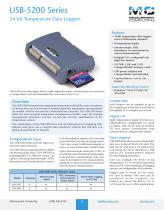
MEASUREMENT COMPUTING. 24-bit Temperature Data Loggers Features • 24-bit temperature data loggers with 8 differential channels • 8 temperature inputs • Thermocouple, RTD, thermistor, or semiconductor sensor measurements • 8 digital I/O, configurable for high/low alarms • 512 MB, 1 GB, and 2 GB CompactFlash® memory cards • USB power adapter and CompactFlash card included • Convert data to .csv or .txt format Supported Operating Systems • Windows® 10/8/7/Vista®/XP, 32/64-bit Overview The USB-5200 Series provides temperature measurement flexibility and convenience in devices that can be moved and installed anywhere temperature measurements are needed, without the need for a dedicated host computer. The USB-5200 Series offers the most accurate temperature measurement possible, since the internal measurement electronics accuracy exceeds the accuracy specifications of the temperature sensors. The combination of the USB-5200 Series and the Measurement Computing DAQ software suite gives you a complete data acquisition solution that will have you taking measurements in minutes. USB-5200 Series Selection Chart Temperature Input The USB-5200 Series provide eight temperature input channels. The USB-5201 is programmable for different thermocouple types. The USB-5203 is programmable for different sensor categories, including thermocouple, RTDs, thermistors and Semiconductor sensors. A 24-bit analog-to-digital (A/D) converter is provided for each pair of analog inputs. Users can connect a different category of sensor to each temperature channel pair. Open thermocouple detection (OTD) is provided to detect broken thermocouples. Cold junction compensation (CJC) sensors are provided for TC measurements, and built-in current excitation sources for resistive sensor measurements. Sample Rate Each channel can be sampled at up to two samples per second for a total device throughput of 16 samples per second. Digital I/O Eight independent digital I/O lines are independently configurable for input or output, and can be used to monitor TTL-level inputs, communicate with external devices, and generate alarms. Data Logging USB-5200 Series devices store temperature data on a Compact Flash (CF) card. The data can be read from a CF reader or by connecting the device directly to a USB port on a PC. External power is required for data logging operations. Users can configure the device to log temperature (°C) or raw data, timestamp data, and CJC sensor readings. All logging options are configurable with software. Logged data is stored on the memory card in binary files and can be transferred to the computer. Use InstaCal to convert the files to .csv or .txt format for use in other applications. Measurement Computing
Open the catalog to page 1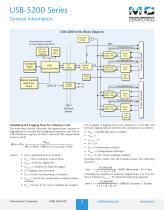
MEASUREMENT COMPUTING. USB-5200 SeriesGeneral Information USB-5200 Series Block Diagram External power required for data logging operations Compact Flash connector Isolated Micro Battery-backed Real-Time Clock Temp sensor Calculating the Logging Time for a Memory Card The following formula calculates the approximate amount of logging time in seconds that a supported memory cards allows. USB-5200 Series supports 512 MB, 1 GB, and 2 GB CompactFlash memory cards. Npisk NTS + NDIO + (NTemp X nChannels) + NCJC where: • time = total disk time in seconds • NDisk = size of memory card in bytes •...
Open the catalog to page 2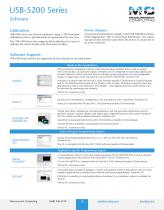
USB-5200 Series Software Calibration Power Adapter Connect the external power supply to the USB-5200 Series device when logging data. Due to processing limitations, you cannot log data to the memory card when the device is connected to an active USB port. USB-5200 Series are factory-calibrated using a NIST‑traceable calibration process. Specifications are guaranteed for one year. The USB-5200 Series also supports field calibration for users to calibrate the device locally with the InstaCal utility. Software Support USB-5200 Series devices are supported by the software in the table below....
Open the catalog to page 3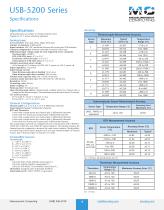
FaaI MEASUREMENT COMPUTING. Specifications All specifications are subject to change without notice. Typical for 25 °C unless otherwise specified. Analog Input A/D converters: Four dual 24-bit, Sigma-Delta type Number of channels: 8 differential Input isolation: 500 VDC minimum between field wiring and USB interface Channel configuration: Software-selectable to match sensor type Differential input voltage range for each supported sensor categories Thermocouple: ±0.080 V RTD (USB-5203 only): 0 V to 0.5 V Thermistor (USB-5203 only): 0 V to 2 V Semiconductor (USB-5203 only): 0 V to 2.5...
Open the catalog to page 4
FaaI MEASUREMENT COMPUTING. Typical Thermistor Resistance Current Excitation Outputs (Ix+) Digital Input/Output Digital type: CMOS Number of I/O: 8 (DIO0 through DIO7) Configuration: Independently configured for input or output. Power on reset is input mode unless bit is configured for alarm. Pull up/pull-down configuration: Pulled up to +5 V via 47 kQ resistors (default). Digital I/O transfer rate (software paced) Digital input: 50 port reads or single bit reads per second typ Digital output: 100 port writes or single bit writes per second typ Input high voltage: 2.0 V min, 5.5 V absolute...
Open the catalog to page 5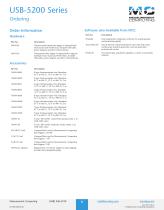
FaaI MEASUREMENT COMPUTING. Order Information Hardware Part No. Description USB-5201 Thermocouple input data logger (CompactFlash) with alarms and 8 DIO lines. Includes USB cable, power adapter, and MCC DAQ software USB-5203 Temperature data logger (CompactFlash) supports multiple sensor types and 8 DIO lines. Includes USB cable, power adapter, and MCC DAQ software DAQami Data acquisition companion software for acquiring data and generating signals TracerDAQ Pro Out-of-the-box virtual instrument suite with strip chart, oscilloscope, function generator, and rate generator...
Open the catalog to page 6All Measurement Computing catalogs and technical brochures
-
ECONseries
10 Pages
-
MCC 172
5 Pages
-
USB Digital I/O
7 Pages
-
USB-3100 Series
7 Pages
-
DT9853 & DT9854
4 Pages
-
USB-1608G Series
6 Pages
-
USB-200 Series
5 Pages
-
Data-Acquisition-Catalog
8 Pages
-
USB-5100 series
8 Pages
-
USB-500/600 series
11 Pages
-
USB-1608FS-Plus
5 Pages
-
WebDAQ 316
7 Pages
















